 W
WAbobo's Big Adventure is a freeware parody flash game. Inspired by various video games released for the Nintendo Entertainment System, the game features Abobo, a boss character from the Double Dragon franchise, traveling through the worlds of several different games to save his son. Written by I-Mockery founder Roger Barr, programmed by Nick Pasto, with art and animation by PoxPower, Abobo's Big Adventure was released in January 2012 to positive critical reception.
 W
WAlex Kidd: High Tech World is a side-scrolling video game with platforming and adventure elements, released by Sega in 1989 for the Master System, that is part of the Alex Kidd series. It is a modified version of the 1987 Japanese Master System game Anmitsu Hime (あんみつ姫), which was based on a manga series of the same name.
 W
WArc Symphony is an adventure video game developed by Matilde Park and Penelope Evans, and released on May 15, 2017, both as a browser game and in a downloadable version for Microsoft Windows, MacOS, and Linux. The player takes the role of a formerly active user of a Usenet newsgroup for a fictional Japanese role-playing game (JRPG), also titled Arc Symphony, and reads messages from the game's characters.
 W
WThe Beginner's Guide is an interactive storytelling video game created by Davey Wreden under the studio name Everything Unlimited Ltd. The game was released for Microsoft Windows, OS X and Linux on October 1, 2015. The game is Wreden's follow-up to the critically praised The Stanley Parable, his previous interactive storytelling title that was initially released in 2013.
 W
WThe Cheetahmen is a video game series created by Active Enterprises featuring three anthropomorphic cheetahs. It was introduced in 1991, as part of the Action 52 multi-game cartridge for the NES. The Cheetahmen also appear in an unpublished sequel for the NES, and an obscure Sega Genesis title that was simply called "The Cheetahmen."
 W
WContact is a role-playing video game developed by Grasshopper Manufacture for the Nintendo DS handheld game console. It was published by Marvelous Entertainment in Japan on March 30, 2006, by Atlus USA in North America on October 19, 2006, and by Rising Star Games in Australia, Asia and Europe on January 25, 2007 and February 2, 2007 respectively.
 W
WCyberdimension Neptunia: 4 Goddesses Online is a Japanese role-playing video game developed by Compile Heart and Tamsoft and published by Idea Factory International. Despite the title, the game is a single-player game with an online cooperative multiplayer option. This is the first Neptunia game to use Unreal Engine 4, as well as the first spin-off game to be released on the PlayStation 4 rather than the PlayStation Vita. It is also the first game that Erin Fitzgerald is not reprising her role as Noire in the English dub, due to the complications with the SAG Contract, and is replaced by Erica Mendez.
 W
WCyberwar is a DOS game based on the film The Lawnmower Man and a direct sequel to the video game adaptation of the film, which itself takes place after the film. It was released in 1994 by SCi. Ports were announced for the Sega CD, 3DO Interactive Multiplayer, and in Japan only for the Sega Saturn and Sony PlayStation, but only the Japan-only PlayStation version was released.
 W
WDream TV is an action video game for the Super NES where the player has to guide two youngsters through a nightmarish land of evil television shows. The player has to escape by defeating stereotypical television villains and finding pieces of a puzzle. The game features complex labyrinths.
 W
WEat Lead: The Return of Matt Hazard is a third-person shooter video game for the Xbox 360 and PlayStation 3 video game consoles. The game was developed by Vicious Cycle Software and published by D3 Publisher.
 W
WGame Dev Story is a simulation video game developed by Kairosoft and published by SNK for Microsoft Windows, iOS, Android, and Nintendo Switch. It was released for Windows in April 1997, on iOS and Android on October 9, 2010, for Windows Phone on July 6, 2015, and on Nintendo Switch on October 11, 2017. The game follows a player-controlled video game company and its attempts to expand into a sales powerhouse over time. As a simulation, the game and the direction of the company is controlled by the player, following a parallel timeline of the video game industry and its history. The game was released to positive reviews, with many reviewers focusing on Game Dev Story's addictive aspects and its witty references to video game pop culture.
 W
WGame Dev Tycoon is a business simulation video game developed by Greenheart Games, which first released on 10 December 2012. In the game, the player creates and develops video games. Game Dev Tycoon was inspired by the iOS and Android game, Game Dev Story, and many critics find substantial similarities between the two games. Game Dev Tycoon was created by Greenheart Games, a company founded in July 2012 by brothers Patrick and Daniel Klug. The game has 1–2 million owners on Steam.
 W
WGame Tengoku: The Game Paradise! is a 1995 vertical-scrolling shooter arcade game developed and published by Jaleco. The game is a parody of arcade shooters in a vein similar to the Parodius series. It was followed up with a sequel, Gun Bare! Game Tengoku 2.
 W
WGift is a platform game developed by French studio Eko System that parodies elements of popular adventure games. It was created by Cryo Interactive's creative director Philippe Ulrich and by author, cartoonist and illustrator Régis Loisel. The game is set over ten levels in a full 3-D world.
 W
WGirls Beyond the Wasteland , often abbreviated as Shokomeza (しょこめざ) and also known as Girls Beyond the Youth Koya in Japan, is a visual novel developed by Minato Soft, released for Windows on March 25, 2016 with a rating for all ages. An anime television series adaptation, produced by Project No.9 and directed by Takuya Satō, premiered in January 2016.
 W
WGod Medicine: Fantasy Sekai no Tanjou is a role-playing video game for the Game Boy. The game was released by Konami in 1993, only in Japan. The game was re-released in 1998 through the Nintendo Power service, adding Super Game Boy support and featuring a bestiary for encountered monsters; this version was called God Medicine Hukkokuban (ゴッドメディスン復刻版).
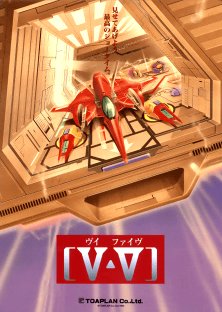 W
WGrind Stormer is a 1993 vertically scrolling shooter arcade video game originally developed and published by Toaplan in Japan and North America. It is considered to be the spiritual successor to Slap Fight. Based around a video game within a video game concept, players assume the role of a young secret agent assigned by the government taking control of the NA-00 space fighter craft in an attempt to defeat the titular virtual reality simulator, rescue the abducted players who lost against it and unveil its true purpose.
 W
WKid Chameleon is a 1992 platform game developed and published by Sega released for the Sega Genesis. The plot of the game is that the boss of the new virtual reality video game "Wild Side" begins abducting players and the main character, Casey, goes to beat it and rescue them. He does this by using masks to shapeshift into different characters in order to use different abilities. It was later released in Japan as Chameleon Kid . After its initial release in 1992 for the Genesis, it was later re-released a number of times in the 2000s, including part of the Sega Smash Pack 2 for the PC in 2000, the Sega Genesis Collection for the PlayStation Portable and PlayStation 2 in 2006, as a digital release on the Wii's Virtual Console in 2007, Sonic's Ultimate Genesis Collection for Xbox 360 and PlayStation 3 in 2009 and for the Sega Forever service in 2017.
 W
WLazy Jones is a platform game for the Commodore 64, ZX Spectrum, MSX and Tatung Einstein. It was written by David Whittaker and released by Terminal Software in 1984. The Spectrum version was ported by Simon Cobb.
 W
WLet It Die is an action role-playing game developed by Grasshopper Manufacture and published by GungHo Online Entertainment. The game was released for the PlayStation 4 in December 2016, and in Japan in February 2017. It was released free-to-play for Windows in September 2018.
 W
WMoon: Remix RPG Adventure is a role-playing adventure game developed by Love-de-Lic and first published in 1997 by ASCII Entertainment for the PlayStation in Japan. Moon is set within a fictional role-playing game where "the hero" has wreaked destruction, killing hundreds of creatures and looting homes. The player takes on the role of a supporting character in this world, attempting to undo the damage done by the hero. Moon has been praised by critics for how it parodies the conventions and tropes of role-playing games.
 W
WNanashi no Game is a first-person survival horror video game developed by Epics and published by Square Enix for the Nintendo DS. The game follows a university student who becomes cursed by the titular role-playing game, which causes people to die in seven days upon starting. It was released on July 3, 2008 in Japan. A sequel, titled Nanashi no Game: Me, was later released on August 27, 2009 in Japan, followed by another sequel in 2012.
 W
WThe Nomad Soul is an adventure game developed by Quantic Dream and published by Eidos Interactive. It was released for Microsoft Windows in 1999 and Dreamcast in 2000. The player can engage in unarmed and armed combat, explore the three-dimensional environment of Omikron City, and talk with non-player characters to progress the story. It follows an investigation into a case of serial killings, which unravels the supernatural truth behind the city's ancient history.
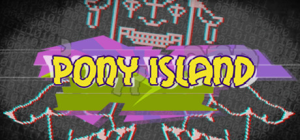 W
WPony Island is a video game developed and published by Canadian indie developer Daniel Mullins. As a metafictional game, the game has the player interact with what appears to be an old arcade cabinet game called "Pony Island". The player soon discovers the game is corrupted by Lucifer himself, who is trying to claim the player's soul for itself. The player is aided by the soul of a previous player who helps the player access Pony Island's internal programming to get around the traps left by Lucifer and save not only their soul, but the many tormented souls that are trapped within the game's code.
 W
WPower Factor is a 1993 side-scrolling action-platform video game developed by Hand Made Software and published by Atari Corporation in North America and Europe exclusively for the Atari Lynx. Based around a video game within a video game concept, players take control of a character who is in turn playing on a virtual reality simulator assuming the role of Redd Ace, which is recreating his battle against the Sinlendo Techmods by recovering necessary bomb components to defeat the alien race at the Ceegraian Power Station. Its gameplay consists of platforming, exploration and weapons-based combat with a main four-button configuration.
 W
WProject Sekai: Colorful Stage! feat. Hatsune Miku is a Japanese mobile rhythm game developed by Colorful Palette and Craft Egg, and published by Sega. The game is a spin-off from Sega's Hatsune Miku: Project DIVA series, and features the Crypton Future Media's virtual singers Hatsune Miku, Megurine Luka, Kagamine Rin and Len, Kaito and Meiko, alongside the cast of 20 original human characters that are split into five units each with a unique theme. The game released for Android and Apple devices on September 30, 2020. In the real world where Virtual Singers only exist as fiction, the characters somehow come across a new world called "Sekai", where various "true feelings" are projected. Sekai's forms change depending on the person's emotions.
 W
WRetro Game Challenge is a Nintendo DS game developed by indieszero and published by Namco Bandai Games. It is based on the television series GameCenter CX and Shinya Arino gave much input into the game creation process. The game was released on November 15, 2007 in Japan, and in North America from Xseed Games on February 10, 2009. The game received a score of 33/40 from Famitsu. On February 26, 2009, a sequel, GameCenter CX 2, was released in Japan. Xseed Games announced that the game was not likely to be translated into English.
 W
WSegagaga, stylized as SGGG, is a 2001 role-playing simulation video game developed by Sega Hitmaker and published by Sega for the Dreamcast in Japan. Described as a "Sega simulation", the player takes control of Sega Tarō, who must help save a struggling Sega from losing the console market to its rival DOGMA, who owns 97%. Gameplay involves battling employees and other characters throughout various Sega development studios, some being taken from older Sega game franchises. It features many tongue-in-cheek references to Sega and the video game industry, particularly Sony and its PlayStation 2 console.
 W
WThe Simpsons Game is an action platformer video game based on the animated television series The Simpsons made for the Nintendo DS, Wii, Xbox 360, PlayStation 2, PlayStation 3 and PlayStation Portable. The game was developed, published, and distributed by Electronic Arts. It was released in North America in October 2007 and worldwide in November 2007. It features an original storyline written by The Simpsons writers Tim Long, Matt Selman, and Matt Warburton. In the self-referential plot, the family discovers that they are forced to participate in another The Simpsons video game. Similar to the show, the game pokes fun at popular culture, other video games, and Electronic Arts, its publisher.
 W
WSonic Dreams Collection is a 2015 art game developed by Arcane Kids for OS X and Windows. It is an unofficial game based on Sega's Sonic the Hedgehog franchise that compiles four minigames presented as unfinished Sonic games, but the game as a whole later reveals itself to be a psychological horror game lampooning the modern Sonic fandom, which is known for its peculiarities.. They include the character creator Make My Sonic, the massively multiplayer online role-playing game Eggman Origin, the adventure game Sonic Movie Maker, and the virtual reality game My Roommate Sonic. They are described in-game as having been developed by a nonexistent Sega studio for the Dreamcast in the late 1990s.
 W
WTravis Strikes Again: No More Heroes is an action-adventure hack and slash video game developed and published by Grasshopper Manufacture. The game was released for Nintendo Switch on January 18, 2019, and for PlayStation 4 and Windows later that year. Directed by Goichi "Suda51" Suda, the game is part of the No More Heroes franchise and features series protagonist Travis Touchdown fighting Badman, the father of Bad Girl. The two are drawn into a possessed video game console, and must fight through its various games. As the first title he has directed since the first No More Heroes, Suda collaborated with several indie developers to feature elements from their games in Travis Strikes Again. While part of the No More Heroes series, Suda does not consider the game a direct sequel to the previous title No More Heroes 2: Desperate Struggle, but a fresh start for the character Travis.
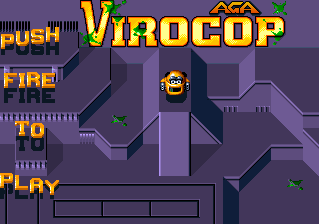 W
WVirocop is a Run and gun game developed by Graftgold and published by Renegade Software in 1995. It is regarded as the third game in the Quazatron series, the others being Quazatron and Magnetron.
 W
WVirtual Bart is a video game developed by Sculptured Software and published by Acclaim Entertainment. It was released for the Super NES and Genesis in 1994.
 W
WWarGames is a 1984 video game developed by Coleco for the ColecoVision, and later ported to the Atari 8-bit family and Commodore 64. The game's goal is to defend the United States against nuclear attack, much in the style of a less frantic Missile Command. The principal designer was Coleco staffer Joseph Angiolillo.
 W
WWarGames: Defcon 1 is a video game for the PlayStation and Microsoft Windows developed by Interactive Studios and co-published by MGM Interactive and Electronic Arts. Although both versions possess the same missions and content, the PlayStation version is a tactical vehicle-shooting game while the PC version is a real-time strategy game. The game is loosely based on the movie WarGames; one of the story consultants was John Badham, director of the original film.
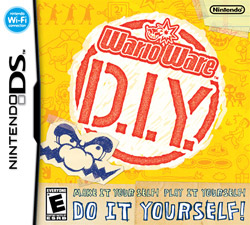 W
WWarioWare D.I.Y., known as WarioWare: Do It Yourself in the PAL region, is a mini-game compilation and design video game released for the Nintendo DS in 2009. It is the seventh title in the WarioWare series, after WarioWare: Snapped! It was revealed at Nintendo's conference on October 2, 2008 and it was released in Japan on April 29, 2009. It was released in 2010 in North America, Europe and Australia respectively and was accompanied by a separate WiiWare title, WarioWare: D.I.Y. Showcase. The game revolves around the Super MakerMatic 21, a machine that allows players to make microgames, music records and 4-page black-and-white comics.
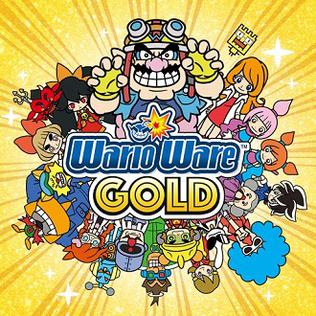 W
WWarioWare Gold is a party video game developed by Nintendo EPD and Intelligent Systems, and published by Nintendo for the Nintendo 3DS. The ninth installment in the WarioWare series, it was released in PAL regions in July 2018, and in North America and Japan the following month.
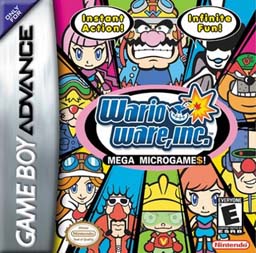 W
WWarioWare, Inc.: Mega Microgames!, stylized as WarioWare, Inc.: Mega Microgame$! and known in the PAL region as WarioWare, Inc.: Minigame Mania, is a minigame compilation party video game for the Game Boy Advance. The debut title in the WarioWare series, the game is about rapid completion of "microgames", short minigames given to the player consecutively and with increasing speed per each game complete. Developed by Nintendo R&D1 and published by Nintendo, the game was inspired by the "Sound Bomber" mode of Mario Artist: Polygon Studio for the Nintendo 64DD. The music and sound effects were recycled from Wario Land 4. The game was produced by Takehiro Izushi and directed by Hirofumi Matsuoka. Matsuoka was also the director of Polygon Studio. Mega Microgames! was released in 2003; in Japan in March, in North America and Europe in May and in Australia in June.
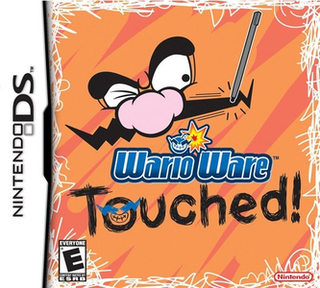 W
WWarioWare: Touched! is a minigame compilation party video game released by Nintendo for the Nintendo DS. The fourth installment of the WarioWare series, and the first of three on the Nintendo DS, the game involves rapidly completing "microgames" — simple minigames lasting extremely short periods of time — as quickly as possible. The microgames are exclusively controlled with the Nintendo DS's touchscreen and microphone.
 W
WWarioWare: Twisted! is a party video game for the Game Boy Advance, developed by Nintendo SPD with Intelligent Systems and published by Nintendo. It was released on October 14, 2004 in Japan; May 19, 2005 in Australia; and May 23, 2005 in North America. The third game in the WarioWare series and the seventh in the Wario series overall, Twisted! was the last Wario game to be released on a Game Boy family system.
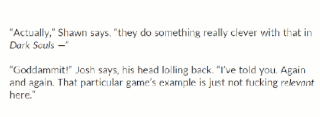 W
WThe Writer Will Do Something is an interactive fiction video game written by Matthew S. Burns and Tom Bissell and created using Twine.
 W
WYu-Gi-Oh! The Falsebound Kingdom is the only GameCube game in the Yu-Gi-Oh! series.